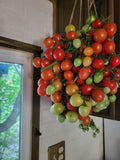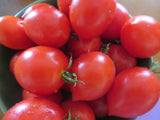Quick facts
-
*Low Impact Food ALERT* No energy intensive food processing necessary for winter eating
*Saving Kitchen Garden Traditions ALERT* This is a culturally significant variety traditionally grown for a specific culinary purposes
- Winter tomato
- Rare
Solanum lycopersicum
We were so happy to have had Bombeta shared with us by a fellow gardener, gardening and seed saving in Greece. Bombeta is an uncommon "winter tomato" variety catagorized as a ramallet from Catalunia in Spain.
Look here for a traditional Bombeta recipe!
Ramallet tomatoes (as they are called in Spain), also known as winter tomatoes and piennolo tomatoes (in Italy), refers to a class of Mediterranean heirloom tomatoes that grow in clusters or tresses. Fruit tresses are strung up at the end of the season and stored at room temperature for fresh eating, ripe and unripe fruit alike. Fruits have thicker skins than ordinary tomatoes and ripen progressively. As they dry off the vine like this, their flavor becomes concentrated. Fruits are great for fresh eating, drying further to sundried tomatoes, and/or saucing. If you're into self-sufficiency and eating well in all four seasons, this is the tomato for you. A great choice for short season climates with long winters! Read about this traditional Mediterranean method for storing tomatoes here.
Ramallet tomato varieties are considered culturally significant and by the Slow Food Ark of Taste. Read a super fascinating history of ramallet tomatoes from the food historians at Slow Foods here!
How to grow it:
|
Germ Temp |
Indoor Start |
Germ Days |
Frost Tolerant |
Sun |
Seed Depth |
Plant/Row Spacing |
|
65-85 |
4-6 w. |
6-9 d. |
No |
Full |
1/8” |
24”/36” |
|
Start seeds indoors 4-6 weeks before average last frost date. Plant seeds in sterile potting soil and provide 7-10 hours of direct light each day. Transplant 24”-36” apart in full sun, while trellising is not necessary it is beneficial for easy of harvest and continued productivity in fall. Seed specs: Packet size- 20 seeds min.
Slow Food ARK OF TASTE: For their rich history and cultural significance, ramallet tomatoes have been featured by the Slow Food Ark of Taste. The Slow Food Ark of Taste is where "culinary heritage meets biodiversity." Varieties placed on the "ark" are those whose rich history and cultural significance is well documented, yet whose existence is threatened simply by the lack of people growing and perpetuating it. Varieties of crops, like species of plants and animals, can (and do) go extinct from lack of habitat and unfavorable conditions. These varieties deserve preservation not just because they each have a great story, but because the futures of our evolving food crops depend on a rich well of genetic diversity with which they can continually adapt, and be adapted by plant breeders, to thrive in changing conditions. In the case of our food crops, the unfavorable conditions leading to a decrease in diversity are many, but one we can immediately address is the decrease in the number of people growing these crops and saving these seeds. |






